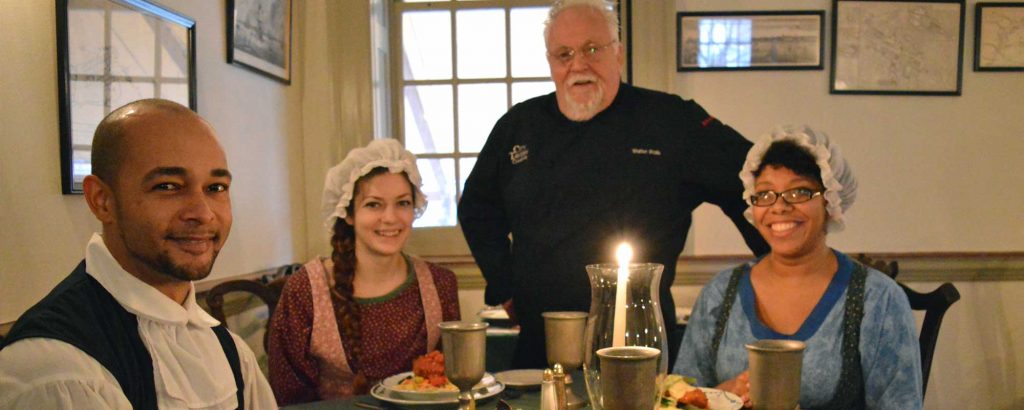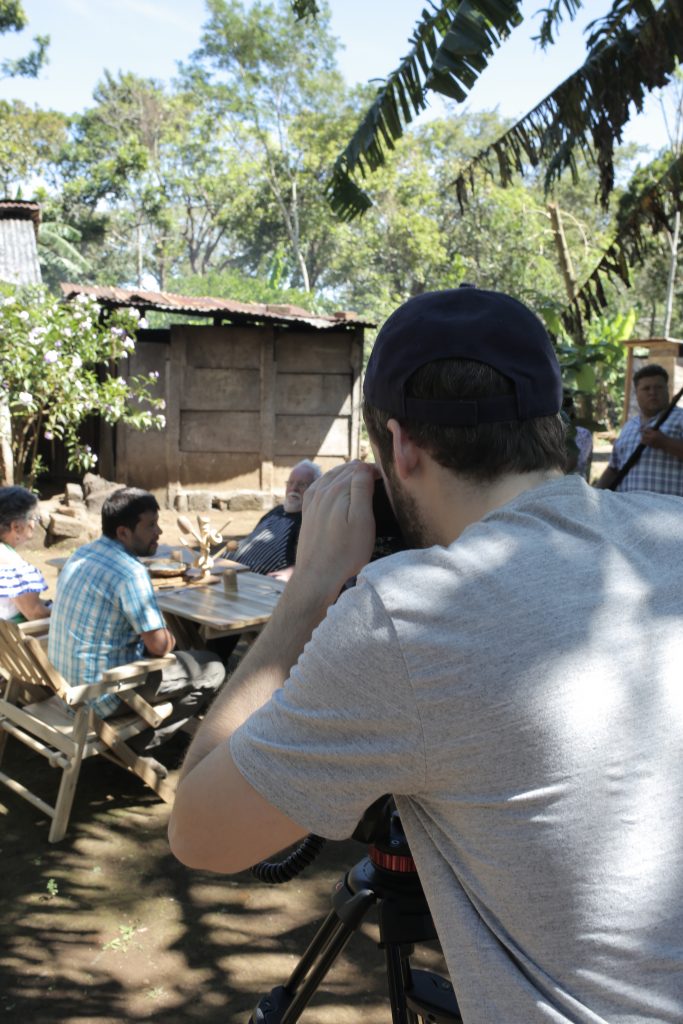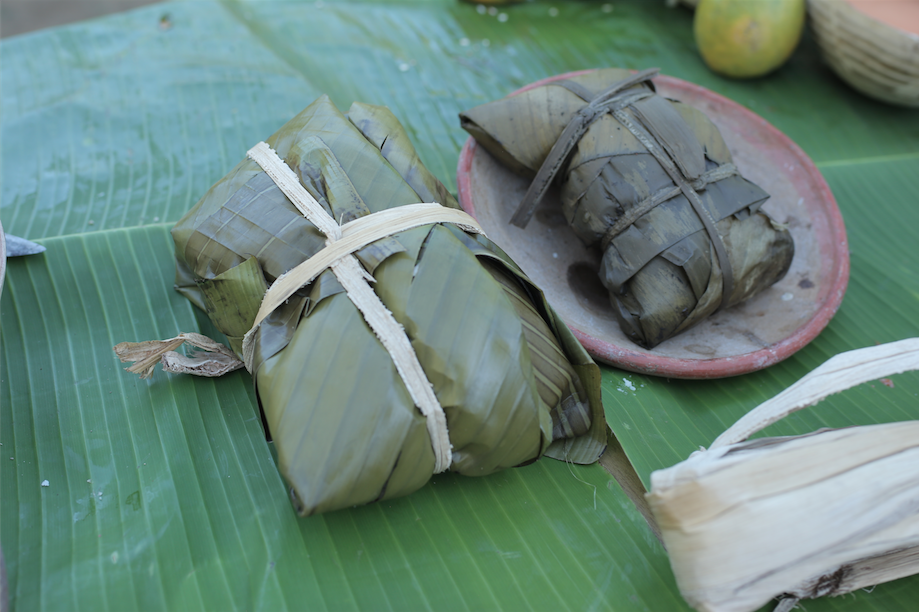CMC professor wins Emmy for work on ‘A Taste of History’ episode

courtesy of Patrick Staib
STEAMBOAT SPRINGS — During the 2019 Mid-Atlantic Regional Emmys ceremony in Pittsburgh, Pennsylvania, recipient Patrick Staib was thousands of miles away, camping in the Utah desert with his crew of Colorado Mountain College Steamboat Springs students who were enrolled in his “Anthropology 280 Southwest Field Exploration.”
“I’d much rather be sleeping in the dirt in Utah than at a black-tie event, so it worked out well,” Staib said.
The Emmy in the “Lifestyle Program: Program/Special” category was accepted for Staib by his father Walter, along with the rest of the production team of A Taste Of History’s season 9, episode 9: “Nicaragua: Flavors of the Pinoleros.”
The Emmy marked the 15th awarded to the show’s makers in its lifetime. In addition to picking up Patrick’s Emmy, Walter took home one for himself for “Talent: Program Host/Moderator.”
Walter Staib’s culinary roots go back three generations. He is originally from the Black Forest region of Germany and spent his early adult life working as a chef across Europe. After immigrating to the U.S. in the late 1960s, he met his wife-to-be, Gloria, an immigrant from Nicaragua.
Walter’s career as an internationally-known chef and food and beverage consultant took him and his family on adventures across the globe, and Patrick grew up learning about food and food systems. He learned to gather elderberries, blackberries and huckleberries and incorporate them into meals. He learned to work on his uncle’s New Hampshire farm plot.
At 13, he started working in restaurants, but he wouldn’t overlap with his father’s restaurants until the mid-1990s, when the Staibs began working on a new project that would eventually lead to “A Taste of History.”
A Taste of History’s season 9, episode 9, “Nicaragua: Flavors of the Pinoleros” can be found on Amazon Prime.
Philadelphia’s City Tavern Restaurant was once frequented by America’s founding fathers and was rebuilt by the National Park Service for the country’s Bicentennial in 1976. But when Walter Staib came across the restaurant, it was in a bad place, having been mismanaged for the large part of 20 years, according to Patrick. But Walter had a vision for how to revitalize the colonial-style tavern, and after applying for Congressional approval to be the tavern’s next operator, was awarded a contract in 1994.

courtesy of City Tavern
Patrick describes his parents’ skill sets as “the perfect blend” for refurbishing and relaunching The City Tavern. Walter dove into researching 18th-century recipes and preparation techniques in the New York Public Library while Gloria outfitted the entire staff in custom, colonial-style garb.
“To think that two immigrants of modest means can come to the United States and believe in the American dream, and make this happen,” Patrick said.
The City Tavern reopened for business on July 4, 1994, staying as true to colonial-period dining as possible. The decor was the original design. The menu offers only what it would have in the 1700s, including duck sausages, brook trout, lobster pie, ales and a pepper pot soup. Ingredients were sourced directly from farmers across Pennsylvania’s Lancaster County. To this day, the tavern has only one freezer, to house ice cream; all other ingredients are preserved by being salted, pickled or preserved via other colonial-era methods.

courtesy of City Tavern
“It was the coolest thing to bring those recipes back to life,” Patrick said.
As a college student, Patrick worked all over the City Tavern — in the front of house, in the back of house, and as a punishment for breaking his curfew, in the dreaded bake shop.

courtesy of Patrick Staib
After graduating college, Patrick’s parents offered him two options: continue his studies or continue to work in the City Tavern.
“I was more interested in the research,” Patrick said.
He went on to learn about and work in food and water systems, including as the farmer and rancher outreach coordinator for the New Mexico Acequia Association and as founding coordinator for the Agri-Cultura Network, a farmer-owned growing and marketing collaborative. Patrick got a PhD in anthropology and master’s degree in Latin American studies. His doctoral dissertation was “Coffee and the Countryside: Small Farmers and Sustainable Development in Las Segovias de Nicaragua.” He notes that his work in alternative food systems and small-scale agriculture is rooted in visiting Lancaster farmers with his father.
“The conversation between the entrepreneur and the farmer, seasonality, knowing your farmer — these are things we’ve mainly lost,” he said. “If something’s going to disappear, we need to get it into a museum before it does.”
In 2014, Patrick began teaching anthropology, sociology and sustainability studies at Colorado Mountain College Steamboat Springs.
Meanwhile, Walter and Gloria had brought the City Tavern to the next level, growing its fanbase, finding a national spotlight, offering prison-to-work staff positions and hosting political candidates’ forums and dinners. Walter had also published a stack of cookbooks, had been named the First Culinary Ambassador of the City of Philadelphia and released two cooking shows.

courtesy of A Taste of History
In the second cooking show, “A Taste of History,” Walter, as executive producer and host, visits historic locations, kitchens and markets, where he explores cultures and eras through his cooking. The not-for-profit series often features cuisine of the 18th century — Walter has cooked at George Washington’s Mount Vernon estate, James Madison’s Montpelier and Thomas Jefferson’s Monticello — but the show is not confined to that century or to the boundaries of U.S. and has also explored the Great Wall of China, Jamaica, France, Malaysia and dozens of other places.
“If you’re going to celebrate American cuisine, you also need to celebrate the Pennsylvania Dutch, the German, the Irish, the Latin American influence, and all these other influences and underpinnings,” Patrick said.
Patrick worked with his father on several episodes in small roles, but the show’s season 9, episode 9 called for more involvement. The episode was one of two episodes in the season that were a tribute to Gloria, who passed away in 2016. The episode takes viewers to Gloria’s native Nicaragua, where the Staibs had been visiting for decades.

courtesy of Patrick Staib
“It was to celebrate my mother and the Nicaraguan influence on my family,” Patrick said. “It was my father coming to closure and bidding her farewell after being married for 47 years.”
Patrick served as a producer — never mind that he had no prior television production experience.
“(Learning how to produce) was trial by fire,” Patrick said. “It was an example of applied anthropology.”
In his role, Patrick sought permits, scouted sites, acquired materials, worked out transportation, translated, cooked, designed sets, held a boom mic and served as a grunt worker.

courtesy of Patrick Staib
“I’m not steeped in film and production,” he said, “but what I am steeped in is truly representing history and a multitude of histories and trying to be as egalitarian in understanding that most of our history comes from the side of the victor, and to help understand the history of the common man.”

courtesy of Patrick Staib
So in the episode, the Staibs presented meals of Nicaraguan fare within historical context.
“Where Nicaragua has suffered (in being mined for gold and silver), where Costa Rica, the rich coast, really hasn’t,” Patrick said. “There’s sincere animosity between them, and Costa Rica has actively appropriated Nicaragua’s indigenous food stuff. So part of our putting Nicaragua on the map and featuring certain foods was deliberate.”
Patrick’s crash-course experience in television production reinforced lessons he’s known for a long time.
“Study these things,” Patrick recommends to his CMC students. “You never know when the opportunity to use them will arrive. Do some awesome social science, go out, experience culture shock, learn a new language, come back and be a rockstar of understanding different ways of knowing.”
Back at home in Steamboat Springs, Patrick’s fellow faculty members at CMC celebrated his Emmy win with burgers and wings at Back Door Grill.
Now, Patrick is looking forward to working with Walter to create more episodes of “A Taste of History,” including one based in the Yampa Valley.
“I already have a script drafted out,” Patrick said. “We could explore mushrooms, wild edibles, thimble berries and so many things. We could do an amazing 30-minute section on the Yampa Valley and really put ourselves on the culinary map.”
How to watch the Emmy-winning A Taste Of History’s Season 9, Episode 9: “Nicaragua: Flavors of the Pinoleros”: Amazon Prime — https://www.amazon.com/Flavors-of-the-Pinoleros/dp/B07M5M549M/ref=sr_1_1?keywords=%E2%80%9CNicaragua%3A+Flavors+of+the+Pinoleros%E2%80%9D&qid=1571785106&sr=8-1
Julia Ben-Asher is a contributing writer for Steamboat Pilot & Today.

Support Local Journalism

Support Local Journalism
Readers around Steamboat and Routt County make the Steamboat Pilot & Today’s work possible. Your financial contribution supports our efforts to deliver quality, locally relevant journalism.
Now more than ever, your support is critical to help us keep our community informed about the evolving coronavirus pandemic and the impact it is having locally. Every contribution, however large or small, will make a difference.
Each donation will be used exclusively for the development and creation of increased news coverage.









